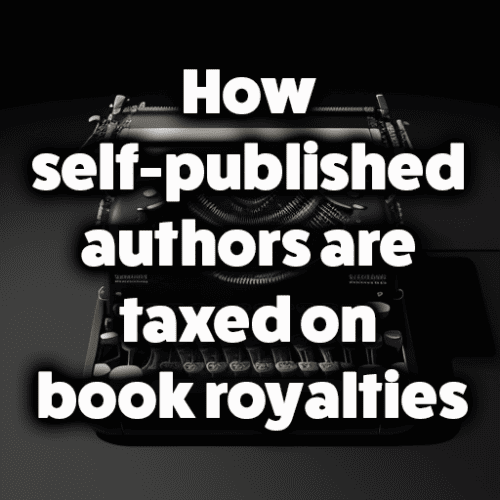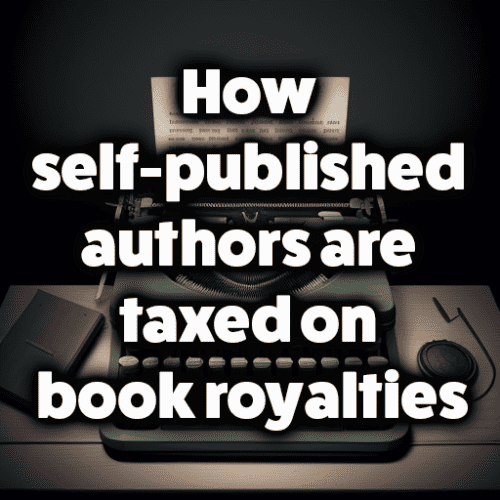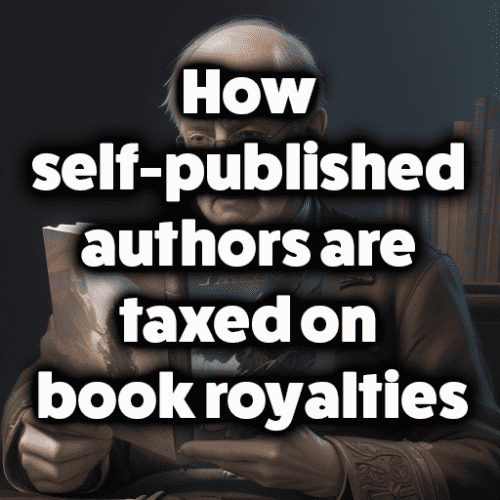How self-published authors are taxed on book royalties
How self-published authors are taxed on book royalties. When it comes to self-publishing, there’s more to the story than just penning a great novel or guide. Sure, the protagonist’s journey might be fraught with battles and heartaches, but there’s another adventure playing out behind the scenes — the author’s financial journey. Self-publishing is not just about creativity; it’s about entrepreneurship. And like any small business owner, self-published authors must understand the tax implications of their venture.
In this labyrinth of numbers and IRS jargon, a valuable resource like Editmojo.com can provide the guidance you need. Buckle up, and let’s delve into the world of book royalties and taxation for self-published authors.
Key Takeaways Table
| Key Point | Details |
|---|---|
| Royalties | Income earned from each book sold. Self-published authors often earn higher royalty rates compared to traditionally published authors. |
| Tax Status | Self-published authors are considered self-employed or independent contractors for tax purposes. |
| Reporting Royalty Income | Royalty income is reported on Schedule E of your federal tax return. Platforms usually provide a 1099 form to assist with this. |
| Deductions & Write-Offs | Costs related to self-publishing (editing, cover design, marketing, etc.) can be deducted from your royalty income. |
| International Tax Issues | Authors selling books in other countries may be subject to international taxes. The U.S. has tax treaties with many countries to prevent double taxation. |
| Editmojo.com | Editmojo.com provides editorial services and resources to help self-published authors understand the financial and tax implications of their work. |
| Tax Tips | Keep track of income and expenses, set aside money for taxes, and seek professional help when needed. |
The Basics of Book Royalties
Imagine if, for every piece of pie you baked, someone gave you a dollar each time a slice was sold. This is essentially how book royalties work. It’s a system where authors earn money from each book sold.
In the traditional publishing world, an author might only make 10-15% in royalties. But in the brave new world of self-publishing, you’re both the baker and the salesperson. This means you keep a bigger slice of the pie, often up to 70% on platforms like Amazon Kindle Direct Publishing.
Take the example of Amanda Hocking, the self-published author who made millions selling her eBooks. With every book sold, she received a substantial royalty payment, catapulting her to stardom in the indie author community.

Understanding Tax Liability for Self-Published Authors
When you self-publish, you’re not just an author; you’re effectively running a small business. And the IRS views you as such — more specifically, as a self-employed individual or an independent contractor.
Personal income tax is what most people are familiar with — the tax on the money you earn from your job. But if you’re self-employed, you also need to consider business tax, which covers the income you earn from your self-publishing venture.
Key tax terms you need to get familiar with include royalties, deductions, and expenses. Royalties are the income from your book sales, while deductions are the expenses related to your self-publishing venture (like editing, cover design, and marketing) that you can subtract from your taxable income. The IRS has a helpful guide on these topics here.
Specific Tax Considerations for Book Royalties
Royalty income is reported on Schedule E of your federal tax return, specifically on the “Royalties” line. In most cases, the platform where you self-publish will send you a 1099 form that reports your royalty income for the year. This makes reporting your royalties pretty straightforward.
But what about deductions and write-offs? Let’s say you hired an editor from Editmojo.com. The fee you paid for their services could be considered a business expense and deducted from your royalty income. The same goes for money spent on cover design, advertising, and even a portion of your internet bill if you work from home. It’s worth noting that there’s also a self-employment tax you’ll need to consider, covering Social Security and Medicare taxes.

Navigating International Tax Issues
Going global with your self-published book? That’s great news! But it can bring additional tax considerations. For example, if you’re a U.S. author selling books in the UK, you may be subject to taxes there as well.
Fortunately, many countries have tax treaties with the U.S. that can prevent double taxation. The IRS has a list of these treaties
here. If you’re a foreign author selling books in the U.S., you’ll likely need an ITIN or EIN for tax purposes.
The Role of Editmojo.com
Where does Editmojo.com fit into this financial odyssey? Think of them as the Gandalf to your Bilbo Baggins. They’re there to guide you on your self-publishing journey, not just with editorial services, but also with resources to understand the tax implications and financial management of your business.
A look at John Doe, a self-published author, paints a clear picture. With Editmojo.com, he not only improved the quality of his books but also gained a better understanding of his tax obligations, enabling him to plan for tax season effectively.
Practical Tax Tips for Self-Published Authors
So, now you’re navigating the tax seas like a seasoned captain. But here are a few more tips to keep you on course:
- Track your income and expenses. Keep all your receipts, invoices, and record of sales. There are plenty of apps that can help with this, or you could go old school with a spreadsheet.
- Set aside money for taxes. Unlike a regular job where taxes are deducted from each paycheck, you’ll need to do this yourself. A good rule of thumb is to set aside 25-30% of your income for taxes.
- Seek professional help if needed. Taxes can be confusing. Don’t be afraid to reach out to a tax advisor or an accountant, especially if you’re earning a significant income from your books.
FAQs about Tax and Self-Published Authors
We’ve covered a lot of ground, but let’s tackle a few common questions and misconceptions about self-published authors and taxes:
- Do I have to pay taxes if I only sell a few books? Yes, technically all income should be reported to the IRS, even if it’s just a few dollars.
- Can I deduct the cost of my laptop as a business expense? Yes, but only if it’s primarily used for your self-publishing business.
- What if I made more money from speaking engagements and merchandise than from selling books? It’s all income related to your self-publishing business and should be reported as such.
Remember, when in doubt, consult a tax professional.

Conclusion (How self-published authors are taxed on book royalties)
Navigating the tax landscape as a self-published author can be a journey as epic as the stories you’re penning. It involves understanding the nuances of royalty income, exploring the world of deductions and expenses, and perhaps, dealing with international tax rules.
But remember, you’re not alone. Resources like Editmojo.com can be your compass in this tax wilderness, and nothing can replace the value of good professional tax advice.
Call to Action (How self-published authors are taxed on book royalties)
Ready to write your next chapter in your self-publishing journey? Be sure to explore Editmojo.com’s resources, and why not join a community of self-published authors? Together, you can navigate the ups and downs of the tax season, and maybe even share a few good stories along the way.
Top Five Questions and Answers
| Questions | Answers |
|---|---|
| How are self-published authors taxed on book royalties? | They are considered self-employed and report royalties on Schedule E of their tax return. Deductible expenses can be written off. |
| What can be deducted as business expenses for self-published authors? | Costs related to the self-publishing process like editing, cover design, advertising, and home office expenses. |
| Do self-published authors have to pay taxes on international sales? | Yes, but many countries have tax treaties with the U.S. to prevent double taxation. |
| What percentage of income should self-published authors set aside for taxes? | A good rule of thumb is 25-30% of the income. |
| How can Editmojo.com assist self-published authors in understanding tax implications? | Editmojo.com provides resources to help authors understand the financial and tax aspects of self-publishing. |
Top Ten Resources and Further Reading
| Resource Name | Description |
|---|---|
| IRS: Self-Employed Individuals Tax Center | A comprehensive guide by the IRS on tax basics for self-employed individuals. |
| Freelancers Union: Tax Tips for Writers | A useful collection of tax tips specifically for writers. |
| Editmojo.com: Self-Publishing Resources | A one-stop resource for self-published authors including tips on financial management. |
| Kindle Direct Publishing: Understanding Royalties | A guide by Amazon on how royalty works in their platform. |
| IRS: U.S. Tax Treaties | A list of tax treaties between the U.S. and other countries. |
| Author’s Guild: Guide to Self-Publishing | A comprehensive guide to self-publishing, including financial implications. |
| Quickbooks for Self-Employed | A handy software for managing income, expenses, and tax preparation. |
| TurboTax: Guide for Self-Employed | A comprehensive tax guide for self-employed individuals. |
| IRS: Deducting Business Expenses | An IRS guide on how to deduct business expenses. |
| The Writer’s Digest Guide to Self-Publishing | A book offering insight into royalties, self-publishing, and more. |
Fun Interactive Quiz: Are You Ready for the Tax Implications of Self-Publishing?
- What percentage of royalties do self-published authors typically earn on platforms like Amazon Kindle Direct Publishing?
- A) 5-10%
- B) 15-20%
- C) 25-30%
- D) 60-70%
- How is royalty income reported on your federal tax return?
- A) Schedule A
- B) Schedule B
- C) Schedule C
- D) Schedule E
- True or False: As a self-published author, you can deduct the cost of a professional editor from your taxable income.
- A) True
- B) False
- What percentage of your income should you set aside for taxes as a self-published author?
- A) 5-10%
- B) 15-20%
- C) 25-30%
- D) 35-40%
- If you’re a U.S. author selling books in the UK, are you subject to taxes there as well?
- A) Yes
- B) No
Answers: 1-D, 2-D, 3-A, 4-C, 5-A
